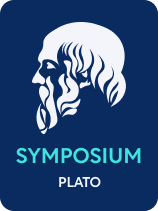

This article is an excerpt from the Shortform book guide to "Symposium" by Plato. Shortform has the world's best summaries and analyses of books you should be reading.
Like this article? Sign up for a free trial here .
What is love? How does love connect to philosophy? How can it lead to human happiness?
The ancient Greek philosopher Plato addresses these questions and more in his Symposium, a work which claims that passionate desire, rather than cold and detached analysis, drives philosophy. Symposium also provides insight into Plato’s views on happiness, education, and reproduction.
Below is a brief overview of Plato’s Symposium on love.
Plato’s Symposium on Love
Plato’s Symposium tells the story of a group of Athenian men at a party all giving speeches in praise of love. Their speeches and discussions quickly lead them to try and answer the question, “What is love?” Plato explores this question through the different characters in attendance, and in the process explains the connection between love and philosophy.
In this article, we’ll explore Plato’s Symposium on love in three parts:
- Early speeches on love’s benefits (Phaedrus, Pausanias, Eryximachus, and Aristophanes’s speeches)
- Descriptions of the god of love (Agathon and Socrates’s speeches)
- Diotima’s description of love (Socrates’s speech)
(Shortform note: Like all of Plato’s works, the Symposium is a dialogue: A philosophical work written as a fictional conversation between characters. The form of dialogue allows Plato to add in intentional ambiguities and implied meanings not just through what is said, but also who says it, why they say it, and how they say it. Like most of Plato’s other dialogues, a majority of the Symposium’s characters are real people from fourth century BCE Athens. Our guide will explain who the Symposium’s major characters actually were and how this might inform philosophical ideas in the work.)
Part 1: Early Speeches on Love’s Benefits
The first four speeches of the dialogue focus on how love can benefit a person. These speeches fit into two categories:
- Love as virtue: Phaedrus, Pausanias, and Eryximachus begin by discussing what kind of love makes a person virtuous—in other words, what is the best and most moral way to love.
- Love as completion: Then, Aristophanes speaks on how love “completes” a person’s life.
In this first part of our guide, we’ll explain the main arguments of each speech regarding the benefits of love.
Love as Virtue
Phaedrus gives the first speech connecting love and virtue, while Pausanias and Eryximachus further develop this argument afterward.
Phaedrus’s Speech
In his speech, Phaedrus argues that all love is beneficial and praiseworthy because it makes people more virtuous. Everyone wants the people they love to view them highly, so when a person is in love they’ll be more driven to do good deeds and more ashamed of their bad deeds.
Pausanias’s Speech
Pausanias disagrees with Phaedrus’s argument that all love is praiseworthy, claiming instead that some love is virtuous and some is not. Pausanias explains that virtuous love focuses on intelligence rather than physicality. People who love only for physical pleasure don’t distinguish between good and bad deeds in service of that pleasure—and therefore are not virtuous. He believes that the most virtuous love is a long, committed relationship between two men: Men are more intelligent and a long relationship allows a lover to better develop the intelligence of their beloved.
Eryximachus’s Speech
Eryximachus mostly agrees with Pausanias on virtuous love but alters his definition slightly. He suggests that virtuous love requires moderation in all loves and desires. Excess and obsession lead people to commit harm or harm their health (in the same way that eating or drinking too much negatively impacts health or judgment), so it follows that moderation leads to good. Eryximachus also suggests that love doesn’t just apply to sex and relationships—after all, people also love arts and activities like sports or music.
Aristophanes and Love as Completion
Following the first three speeches that try to define love as virtuous and beneficial, Aristophanes approaches the subject in a new direction. He tells a wild story proposing that love allows a person to complete themselves: Humans used to be two people in one, fused back to back. However, they became arrogant, and the gods split them in half as a punishment. Now, love and sex are human attempts to return to that previous combined, “whole” state. From this story, Aristophanes draws three main conclusions:
- People have “soulmates.” Aristophanes suggests that everyone still has their other half in the world somewhere, and they are perfect for each other.
- Love is the desire to become whole. What people experience as love is actually just their desire to become whole again. This is why soulmates that find each other will stay together for their entire lives—it’s as close they can get to being whole again.
- Homosexuality (among men in particular) is natural and moral. Aristophanes claims that some of the dual-humans were pairs of two women or two men—and so their love results from the same divine “split” that created heterosexuality. In addition, Aristophanes suggests that homosexual men are more courageous and manly—and therefore more moral—than heterosexual men because they’re attracted to those traits in others as well.
(Shortform note: If you think Aristophanes’s speech feels out of place, then you’re right—and scholars suggest that Plato did that on purpose. For the most part, the men in the Symposium speak from left to right, and each speech develops the ideas of the previous. However, Aristophanes breaks both of these rules—they skip over him until later, and the ideas of his speech mostly exist independently. Scholars suggest that this is Plato saying that Aristophanes (a staunchly conservative comic playwright and strong critic of Socrates) and others like him don’t contribute to the development of wisdom—and even disrupt it.)
Part 2: Descriptions of the God of Love
Agathon’s speech again approaches love in a new way—addressing not the benefits of love, but rather love itself: Eros, the god of love.
(Shortform note: To better understand the distinction Agathon makes between love and the god of love, let’s examine the Greek word for love that the Symposium uses: eros. Eros means love in the sense of passionate desire, usually in a sexual context (the English word “erotic” derives from eros). However, Eros is also the name of the god of love and sexual attraction—a god the Romans called Cupid. At the start of his speech, Agathon argues that the others only spoke of the feeling eros, rather than the god Eros. To make this difference clear, our guide will use Eros to describe the god, and “love” to describe the feeling—even though “eros” technically applies to both.)
This second part of our guide will explain the main ideas of Agathon’s description of Eros, as well as Socrates’s rebuttal and alternative description.
Agathon’s Description of Eros
Agathon describes Eros as having many qualities—but these qualities tend to fall into three categories:
- Eros is beloved: Agathon describes Eros as a beloved—a creature of beauty, grace, and eternal youth who’s desired by others rather than being the desirer himself. Everyone desires Eros, but he surrounds himself only with other beautiful and soft things.
- Eros is an artist: Agreeing with Eryximachus that love can apply to all arts and skills, Agathon claims that Eros must be an expert at them all. Since love inspires people to become great artists, then the god of love must have talent himself to impart to others.
- Eros is good: Agathon suggests that love is incompatible with injustice or other evils—as a result, Eros is always fair, generous, and moral in his dealings and actions.
(Shortform note: Historical context helps to contextualize the ideas of Agathon’s speech. Agathon was a poet in ancient Athens known for his tragic plays and incredible physical beauty. He was also the beloved of Pausanias (who spoke earlier in the dialogue) in a relationship that ended up lasting 30 years (far longer than was typical of pederasty). Based on these details, scholars generally suggest that Agathon compares himself to Eros in his speech—he speaks of the great physical beauty and poetry of Eros, and of his virtue in relationships (something that Agathon’s lover Pausanias also discusses). By comparing himself to Eros, Agathon further cements his view that Eros is the beloved of a pederastic relationship.)
Socrates and Diotima’s Description of Eros
Socrates praises the beauty of Agathon’s speech, then politely informs him that everything he said was wrong. Then, Socrates gives his own speech on love. His speech mainly consists of him recounting a past conversation he had with a wise woman named Diotima. Diotima, he says, taught him everything he knows about love. For the rest of the guide, we’ll discuss Diotima’s explanation—but keep in mind Socrates is actually the person present and speaking at the party.
(Shortform note: In a dialogue primarily concerned with the intellectual and homoerotic lives of men, it might seem confusing that Socrates cites a woman for his views on love. Scholars suggest that Socrates cites Diotima as a way to gain credibility. Diotima speaks at length on childbirth, pregnancy, and reproduction (which we discuss later in the guide), all subjects strongly associated with women and femininity in ancient Athens. These scholars therefore suggest that Socrates (and perhaps Plato through him) uses Diotima to appeal to that perceived feminine “expertise” in his arguments.)
According to Diotima, Eros is not beloved, but rather is a lover—one that desires and seeks out beautiful things. Instead of a soft, youthful, and beautiful god, he’s an old, tough, and hardened spirit. He acts as a messenger between the humans and gods, delivering human prayers and offerings to the gods and divine instructions or blessings to humans.
(Shortform note: Plato evokes Socrates—an old, gnarled man seeking out beauty and wisdom—with this description of Eros. Plato’s works (and the Symposium in particular) are some of the only surviving descriptions of who Socrates was and what he was like—other descriptions include Aristophanes’s The Clouds (a comic play satirizing Socrates and his philosophy) and philosopher Xenophon’s dialogues. All three of these works present Socrates as absent-minded, unkempt, and more interested in knowledge than he is in the concrete world around him. By having Diotima describe Eros in a similar way, Plato implies that Socrates is the ideal erotic man—a claim that makes more sense once Diotima connects love and philosophy.)
To explain this conclusion, she further defines the act of loving and what it reveals about Eros.
What Loving Is
Diotima begins by describing the act of loving—after all, loving is by definition what Eros does. She reaches the following two conclusions:
- Love requires an object: Love only exists in relation to something else. For example: “Aristophanes loves wine.” Without the object, the sentence makes no sense: ”Aristophanes loves” doesn’t mean anything.
- People love what they don’t have: Loving an object means desiring it, and nobody would desire something they already have. If someone says they love something they have, it actually means they desire to continue having it.
(Shortform note: Some scholars suggest that because of these two conclusions, Plato presents a tragic view of love. By definition, Plato says we love what we don’t have and can never get—if we ever got the object of our love, then we’d either stop loving it or worry about losing it in the future. She suggests that those with an excess of such desires can often end up as tragic figures, with lives defined by longing, incompleteness, or a lack of satisfaction. As you read the rest of the guide, keep in mind how Plato’s view on love might create such a tragic figure—especially once we get to Alcibiades’s speech.)
What Eros Isn’t
Based on her conclusions about loving, Diotima outlines four things that Eros is not:
- Eros is not beautiful: Eros desires beauty, and people desire what they don’t have. Therefore, Eros isn’t beautiful.
- Eros is not good: All good things are beautiful—that’s why they’re attractive. Since Eros desires beauty, it follows that he desires good as well and therefore is not good himself.
- Eros is not wise: Wisdom is a good and beautiful quality, so Eros must desire it—and, therefore, lacks it.
- Eros is not a god: Gods are perfect beings that lack nothing—since Eros lacks beauty, goodness, and wisdom, it follows that he isn’t a god.
However, this doesn’t mean that Eros is ugly, bad, ignorant, and mortal—instead, he exists somewhere between all of these extremes. Someone who is entirely bad doesn’t desire goodness, and someone who is entirely ignorant is unaware of their ignorance and therefore doesn’t desire wisdom. Therefore, Eros has just enough wisdom and goodness to recognize what he doesn’t have—and to recognize that he wants it.
(Shortform note: Plato’s Apology clarifies what it means to be “between extremes,” particularly the extremes of wisdom and ignorance. In the Apology, Socrates distinguishes between divine wisdom and human wisdom: Divine wisdom (the wisdom of the gods) is absolute knowledge of all things, while human wisdom is the ability to recognize how little you actually know. Socrates suggests that people are better off recognizing what they don’t know than they are incorrectly assuming that they have knowledge—recognizing you know nothing encourages you to learn and examine the world around you. Diotima describes Eros as having a similar type of wisdom since he both desires knowledge and lacks the divine wisdom of the gods.)
Part 3: Diotima’s Description of Love
After describing Eros, Diotima discusses the human experience of love. She concludes that the main object of love is not beauty.
In this third part of our guide, we’ll explain Diotima’s views on human love by explaining what humans love, why humans love, and how humans should love.
What We Love
To understand the human experience of love, Diotima first outlines what humans love. She suggests that, instead of beauty, the main object of human love is goodness. This is because goodness brings people happiness—a meaningful life well-lived. By definition, a good life is a happy life.
Furthermore, Diotima concludes that humans desire immortality: As explored earlier, if people have good things, they desire to continue having them. Therefore, people want to permanently have good things. The longer someone lives, the longer they can have good things, so by desiring goodness people desire immortality.
(Shortform note: To understand what Plato means by happiness, it helps to consider the original Greek word: eudaimonia. Eudaimonia is usually translated to “happiness,” though it doesn’t entirely match our modern definition. While we usually think of happiness as a temporary positive emotion, eudaimonia refers to an overall state of living life excellently. The stabler, longer-lasting state of eudaimonia also explains why Diotima says people want permanent good—she’s saying people want to always live excellently, not that they want to always experience pure joy or bliss.)
Why We Love
Diotima suggests that the purpose of love is reproduction, either in a physical sense (creating a child) or a mental sense (creating virtue and wisdom). Creating physical or mental offspring is the closest a human can get to becoming immortal (and therefore permanently having good things). An individual’s offspring will live much longer than they do—physical children will carry on parts of their ancestors, and great works of art, ideas, or virtuous acts are often remembered long after the death of their creators.
Diotima emphasizes in particular the importance of mental children—a great work or great deed lives far longer than any physical child, and therefore brings its parent closer to immortality.
(Shortform note: It seems like Plato contradicts his other dialogues here by saying we reproduce because we desire immortality. In several of his other works (including the Meno and Phaedo), Plato argues that people have immortal souls (his idea of the soul is similar to the mind or the self) that are reborn into many different bodies. This raises the question: If our souls are immortal, then why is reproduction the closest we can get to immortality? Some scholars argue that this is an inconsistency where Plato temporarily appeals to a more pragmatic, skeptical viewpoint. Others suggest that in the Symposium, Plato talks about individual immortality—immortality of one person rather than of their soul (which over time inhabits many people).)
Love as Reproduction
According to Diotima, everyone is pregnant in some way—every individual has the potential to create physical or mental offspring. However, people can only give birth in the presence of beauty:
In a physical sense, beauty excites people to seek out suitable sexual partners and makes them happy and relaxed enough to engage in sex (or, later on, childbirth).
(Shortform note: You might wonder why Diotima suggests that males and females can become physically pregnant. Scholars suggest that Plato refers to ejaculation as the male form of pregnancy and childbirth: An aroused male is pregnant and gives birth upon ejaculating. This conception of male childbirth further cements the connection Plato’s trying to make between beauty and childbirth—beauty inspires sexual arousal which allows a male to “give birth” and ejaculate during intercourse.)
In a mental sense, a beautiful body or beautiful mind inspires new ideas. Particularly, Diotima suggests that a beloved with a beautiful mind and body can inspire a lover to birth excellent intellectual offspring. These intellectual children are speeches on virtue or wisdom that make up the educational component of a pederastic relationship.
(Shortform note: Plato seems to have two competing ideas on intellectual offspring in a pederastic relationship. He mentions one just above: A beautiful beloved inspires their lover to birth intellectual offspring. However, Plato’s Theaetetus suggests that Socrates acts as a “midwife of the soul”—just as a normal midwife helps deliver physical offspring, Socrates helps deliver mental offspring. This metaphor suggests that the lover (Socrates) actually inspires the beloved to birth intellectual offspring. Scholars suggest that this contradiction might result from Plato’s personality and ambiguous feelings on homosexual desire—the Symposium’s view seems to celebrate these desires, while the Theaetetus takes a more restrained approach.)
How We Should Love
Since people only give birth in the presence of beauty, it follows that beauty is crucial for a good life—even if it isn’t the main goal of love. Diotima then explains how to pursue beauty and birth offspring in a way that leads to the happiest life possible.
The Ascent
Diotima explains that the best way to pursue beauty requires a journey of self-realization that she calls the “ascent”: A process of learning to love beautiful things that are more and more good and meaningful.
- An ascendant’s natural desire for beauty inspires them to create intellectual offspring—in other words, it inspires them to develop their rational abilities and do philosophy.
- A long-term dedication to reasoning and thinking about beauty eventually allows the ascendant to understand what beauty itself actually is—and since all good things are beautiful, an understanding of beauty itself allows the ascendant to understand what goodness itself is.
- Diotima describes this understanding in terms of intellectual reproduction—in the presence of absolute beauty, the pupil can birth intellectual offspring that are absolutely and universally true.
Anyone who completes the ascent has a happy life (a meaningful life well-lived). By that point, they’ll have created intellectual offspring that are permanently and absolutely good—because these offspring reveal eternal truths about goodness itself. Creating eternal and good offspring gets a human as close as they can to immortality.
The Steps of the Ascent
Diotima outlines six steps of the ascent:
1) Love of one beautiful body: First, an ascendant is physically attracted to one beautiful body, inspiring them to create intellectual offspring.
2) Love of all beautiful bodies: The ascendant will eventually recognize that there’s no reason to desire one physically beautiful body more than another since they all share beautiful attributes in common. Therefore, the ascendant comes to love all beautiful bodies.
3) Love of all beautiful minds: As the ascendant continues to reason and birth mental offspring, the focus of their desire will shift from physical beauty to mental beauty—they’ll start to love wise and moral individuals regardless of their physical appearance.
4) Love of beautiful activities and institutions: Once the ascendant appreciates the beautiful minds of wise and moral people, they’ll come to appreciate the activities, laws, and systems in their society that create these beautiful minds.
5) Love of beautiful knowledge: The ascendant will realize what creates beautiful minds, activities, and institutions—knowledge. From there, they’ll love the beauty of human knowledge and will seek it out.
6) Love of beauty itself: By pursuing beautiful knowledge and birthing intellectual offspring, the ascendant expands the scope of their knowledge and reason until they can finally understand something of beauty itself. This abstract concept of beauty is perfect, eternal, and unchanging—all beautiful things take part in it, but they’re all flawed in comparison.
(Shortform note: Scholars often debate the following question in discussing the steps of the ascent: When someone ascends, do they stop loving objects in the previous steps? For example, does someone on the fifth step no longer love individual people? Some scholars suggest that the ascent provides a strict hierarchy and that ascendants will stop loving individuals in favor of abstract objects or theories. Others argue that while the ascent does prioritize abstract ideas, it doesn’t prevent an ascendant from loving an individual. From this perspective, the ascendant can still appreciate the beauty of the lower steps—they’ll just spend less time doing so as they ascend further.)
Alcibiades and Love of Socrates
At the end of Socrates’s discussion of love, the young man Alcibiades crashes the party, drunk, and gives a speech not on love, but on Socrates. In his speech, Alcibiades discusses his love for and difficulty courting Socrates. His description of Socrates seems to describe someone who has completed the ascent—a person who concerns themselves with abstract knowledge rather than concrete physical pleasures or pains. Alcibiades’s two main points both emphasize Socrates as a man unconcerned with physical things:
1) Switching the lover and beloved: Alcibiades, a beautiful young man, expected Socrates to pursue him as the lover to his beloved. However, while Socrates would happily spend time with Alcibiades and talk to him, he never showed any sexual interest. Frustrated and in love, Alcibiades switched the normal dynamic: He acted as a lover pursuing Socrates as his beloved. Despite his very forward pursuits, though, Socrates still never had sex with him.
2) Socrates’s strength and bravery: Alcibiades also discusses Socrates’s physical strength and stamina as well as his courage. He says that Socrates never seems affected by physical challenges like cold, drunkenness, or tiredness. In addition, he talks about the time they spent in war together, where Socrates never showed fear and even saved Alcibiades’s life in a battle.
(Shortform note: Understanding the role of Alcibiades in the Symposium requires some historical context. The real Alcibiades was an Athenian statesman who famously defected to the enemies of Athens in the Peloponnesian War. Scholars suggest that in the Symposium, Plato connects the physical desires of Alcibiades to his political and moral “corruption,” showing that they disrupt virtuous and philosophical life. This shows in Alcibiades’s speech and actions: He crashes the party drunk, speaks out of order (like Aristophanes), doesn’t talk about love (talking instead about his lust for Socrates—he “descends” the dialogue from discussing beauty itself to discussing one individual) and leaves the door open for others to enter and cause chaos.)

———End of Preview———
Like what you just read? Read the rest of the world's best book summary and analysis of Plato's "Symposium" at Shortform .
Here's what you'll find in our full Symposium summary :
- Plato’s philosophies on love, happiness, education, and reproduction
- Agathon’s description of Eros, the god of love
- What it means to love beauty itself






